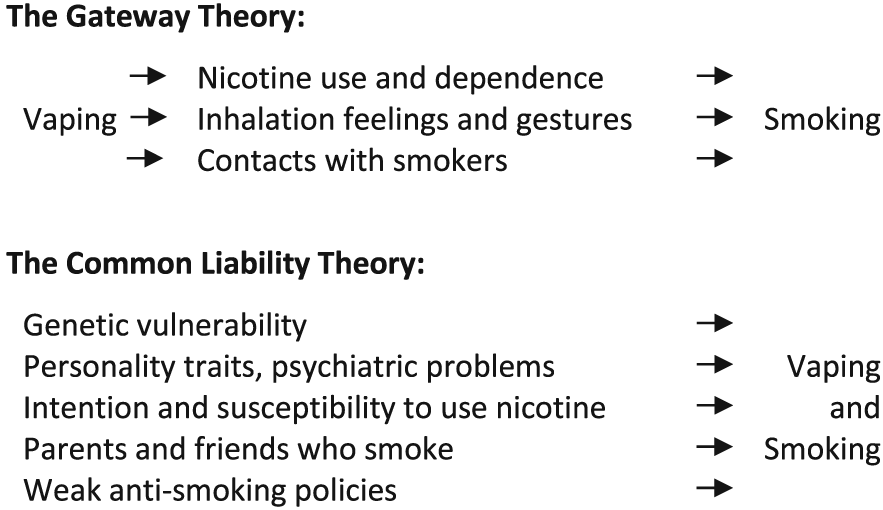Addiction continues to be the go-to journal for e-cigarette promotion, this time attacking the ecig gateway effect
Last August (2017), the journal addiction published a paper by Jean François Etter, “Gateway effects and electronic cigarettes,” that tried to dismiss the very strong and consistent evidence that adolescents who initiate tobacco product use with e-cigarettes are more likely to go on to smoke cigarettes, the so-called “gateway effect.”
Much like past tobacco industry efforts to use the Bradford Hill criterial for causal inference to dismiss the evidence linking smoking with lung cancer, Etter came up with something analogous to the industry’s old “constitutional hypothesis” that argued that smokers got lung cancer because there was some genetic factor that both increased the risk of lung cancer can made it more likely that someone would start smoking. Figure 1 in his paper sums up his position:
Following standard academic procedure, Simon Chapman and David Bareham submitted a letter to Addiction pointing out all the problems with Etter’s arguments and summarizing, in detail, the evidence that the available evidence does support the gateway hypothesis as well as the detailed evidence that his common liability theory is silly.
One point that Chapman and Bareham did not include was the consistent evidence that around a third of kids who start tobacco product use with e-cigarettes have risk profiles that make them unlikely to start with cigarettes. We demonstrated this using national data as well as the fact that the effect of all these low-risk kids starting with e-cigarettes had increased the number of kids using nicotine above those using cigarettes. (There are also regional studies showing the same thing; see citations in our paper for the references.)
Addiction rejected Chapman and Bareham’s letter as too long and, instead offered Chapman and Bareham the opportunity to condense their response to 500 words, which would presumably be published with a response from Etter. While this is certainly one option, if the editors of Addiction were going to be evenhanded they could also have invited Chapman and Bareham to turn their letter into a paper.
Chapman posted the response to Etter on the University of Sydney eScholarship site; it is worth reading and is available here.

Consistency . . .
This excoriating response letter to a Farsalinos et al paper is approximately 1000 words in length . . . a shame further that there appears no consitency!?
http://onlinelibrary.wiley.com/doi/10.1111/add.13066/full" title="http://onlinelibrary.wiley.com/doi/10.1111/add.13066/full";http://onlin…
David Bareham
Quantifies Addiction's bias and raises
The last paragraph says:
<blockquote;
We are concerned that the extraordinary rapidity with which this particular manuscript was reviewed was a contributing factor in the issues raised here. That is, each <em;Addiction</em; Research Report provides the date of manuscript submission as well as the date of completion of initial review. The span between these two dates for this paper was 11 days, whereas the mean for every other Research Report published in Vol. 110 (2015) of <em;Addiction</em; (issues 1–6, excluding Supplement 1) was 87 days, with a range of 42–342 days (<em;n =</em; 61; standard deviation = 46). How was this paper, and no other in 2015, ushered through the review process so quickly? Interestingly, <em;Addiction</em; \Editor-in-Chief Dr Robert West has asserted publically that ‘E-cigarettes are about as safe as you can get… E-cigarettes are probably about as safe as drinking coffee’ [<a class="link__reference js-link__reference" href="http://onlinelibrary.wiley.com/doi/10.1111/add.13066/full#add13066-bib-…; rel="#add13066-bib-0009" title="Link to bibliographic citation";9]. These statements suggest a potential conflict of conscience [<a class="link__reference js-link__reference" href="http://onlinelibrary.wiley.com/doi/10.1111/add.13066/full#add13066-bib-…; rel="#add13066-bib-0010" title="Link to bibliographic citation";10] in the handling of a flawed report that reinforces Dr West's professed faith in e-cigarette safety, although of course we do not know the extent to which that potential conflict played a role in this case.
</blockquote;
This is certainly consistent with my experience in dealing with <em;Addiction, </em;which only would consider publishing the paper Maggie Kulik and I wrote documenting the fact that the alleged "hard core" of smokers is melting away as smoking prevelance drops (i,e, the remaining population of smokers is softenining not hardening). We ended up withdrawing the paper and publishing it in <em;https://www.ncbi.nlm.nih.gov/pubmed/26108654" target="_blank";Tobacco Control.</em;
Then, astonishingly, <em;Addiction </em;published a paper trashing our findings and https://tobacco.ucsf.edu/addiction-refuses-allow-discussion-industry-ti… not allow us to talk about the industry connections of the authors in our response.
This consistent pattern is why I don't even send papers to <em;Addiction </em;and generally don't ttust anything they publish on e-cigarettes or har reduction.
Addiction needs to address conflicts of conscience
Note that the Talih et al letter ended thusly: "We ask that <em;Addiction</em; consider addressing conflicts of conscience and their management in future editions of its ethical guidelines [<a class="link__reference js-link__reference" href="http://onlinelibrary.wiley.com/doi/10.1111/add.13066/full#add13066-bib-…; rel="#add13066-bib-0011" title="Link to bibliographic citation";11] and that it reaffirm its commitment to the scientific enterprise by upholding rigorous peer review practices, especially in cases where work is produced by industry-funded authors."
Thus far, to my knowledge, no action has been taken and <em;Addiction</em; has not responded to this request (which was the primary reason for the letter). Anyone interested in objective science is encouraged to stop supporting <em;Addiction</em; -- that is, stop submitting mansucrips to the journal and stop reviewing for the journal -- until it has published the means by which it will manage the apparent conflicts of conscience among its editorial staff and reaffirmed its commitment to the scientific enterprise by upholding rigorous peer review practices. That is the approach I have taken. Thomas Eissenberg.
Tom is absolutely correct
I have also stopped sending papers to Addiction and will no longer review for them until this problem is addressed.